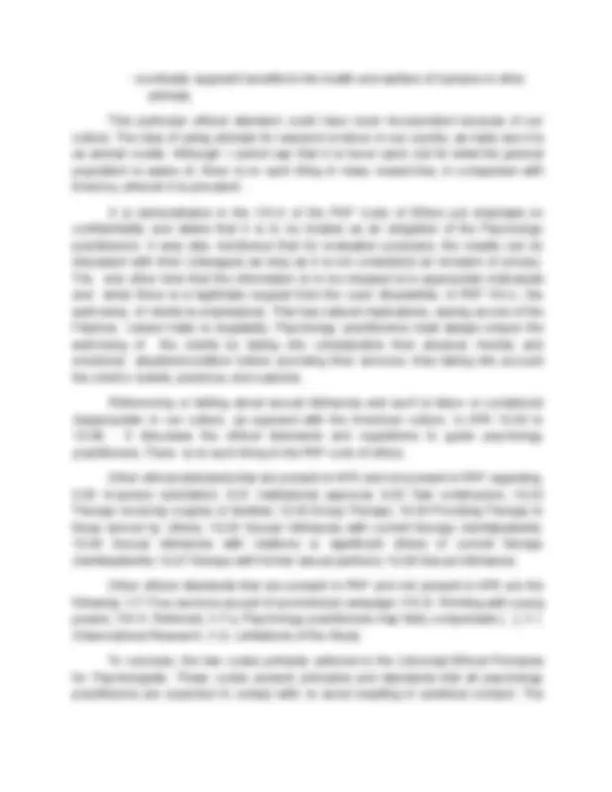




Study with the several resources on Docsity

Earn points by helping other students or get them with a premium plan


Prepare for your exams
Study with the several resources on Docsity

Earn points to download
Earn points by helping other students or get them with a premium plan
Community
Ask the community for help and clear up your study doubts
Discover the best universities in your country according to Docsity users
Free resources
Download our free guides on studying techniques, anxiety management strategies, and thesis advice from Docsity tutors
APA & PAP Compare & Contrast Paper
Typology: Papers
1 / 4

This page cannot be seen from the preview
Don't miss anything!




On special offer
BS Psychology II APA & PAP COMPARE AND CONTRAST The Code of Ethics of the American Psychological Association and Psychological Association of the Philippines adopted and adhered to the Universal Declaration of Ethical Principles for Psychologists. These psychological associations of two different countries compass ethical guidelines and professional standards to be upheld by the members of these associations. The Codes are made according to the fundamental values, standards, societal and cultural norms of the country. The American Psychological Association (APA) adopted a code of ethics on August 21, 2002 and was amended by the Council of Representatives on February 20, 2010, effective June 1, 2010. The following amendment on August 3, 2016, effective January 1, 2017 up to present. The Psychological Association of the Philippines (PAP) adopted a Code of Ethics for the Philippines in 2008. In December 2015 a review of this Code was undertaken to reflect advancements or changes in the field of Psychology. The Ethics Code of the APA is intended to provide guidance for psychology professionals. The PAP Ethics Code shall govern the norms of conduct and ethics of all registered Psychologists and Psychometricians. The members of the APA are to comply with the standards of the APA Ethics Code and to the rules and procedures used to enforce them; the members of PAP are to comply with the standards of the PAP Ethics Code and the procedures used to enforce them. There are certain Ethical standards and considerations that are not present in APA Ethics Code that exist in the PAP Ethics Code, and vice versa. It could be considered that the major differences of the two codes can be traced back to the cultural differences in the countries where it is instituted. It is important to keep in mind that the two codes are based in the Universal Declaration of Ethical Principles for Psychologists; contrary to the notion that the PAP was based on APA. Some specific positive traits that most Filipinos value are: hospitality, respect, and love and caring. Respect is exhibited in the first principle, Respect for the Dignity of Persons and Peoples. It was shown that respect is for the: unique worth and inherent dignity of all human beings, diversity, customs and beliefs of cultures. It also includes: free and informed consent, privacy of individuals etc., protection of confidentiality, fairness and justice. Hospitality is one of the most popular qualities of Filipinos, which is greatly appreciated by foreign tourists. Hospitality aligns with the love and caring trait. This is
reflected in the second principle of the PAP, namely Competent Caring and Well-Being of Persons and Peoples. A few notable values under this principle are: active concern for the well-being of individuals etc., ensuring that no harm is done, and respect for the ability of individuals, etc. To sum it up, "Competent caring for the well-being of persons and peoples involves working for their benefit and, above all, doing no harm to them." The American fundamental beliefs include the importance of common good which is held highly. It is incorporated in the APA, wherein there is an emphasis to promote the welfare of the community and also to work alongside others for the greater benefit. Reflected in the general principles of the APA code of ethics is justice. Justice is included in the fundamental beliefs, " People should be treated fairly in the distribution of the benefits and burdens of society, the correction of wrongs and injuries. and in the gathering of information and making decisions." According to Principle D of APA, "Psychologists recognize that fairness and justice entitle all persons to access to and benefit from the contributions of psychology and to equal quality in the processes, procedures, and services being conducted by psychologists..." The following paragraphs will specifically state the differences that I have noticed between the APA and PAP code of ethics. APA 3.05 A. articulates; “Multiple relationships that would not reasonably be expected to cause impairment or risk exploitation or harm are not unethical. ” This is not present in the PAP code of ethics. A probable reason is the immense population of Catholics in the Philippines and the illegality of adultery. Meanwhile, in the US, adultery is only technically illegal (in some states it is merely deemed as a misdemeanor) in less than half of the states. This suggests that as long as the psychology practitioner maintains professionalism during their working hours, it is not unethical. PAP V.B. articulates a thorough guideline and procedure for when releasing public statements. One potential reason for this is the strict work ethic that Filipino psychology practitioners abide by. This personal statement does not imply that American psychology practitioners don’t abide by a strict work ethic because that is not true. However, Filipinos are known for following a strict work ethic and it is even considered as one of our positive traits. In APA X.J Human Care and Use of Animals in Research, it articulates that the only time that the use of animals in research can be regarded as ethical is to: ∙ further increase understanding of the structures and processes underlying human or animal behavior; ∙ increase understanding of the specific specie used in the study; or
improvements are continuous to fulfill the changes that happen in the field of psychology.